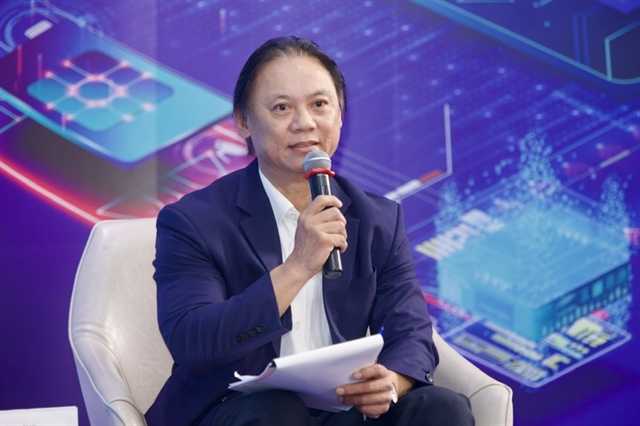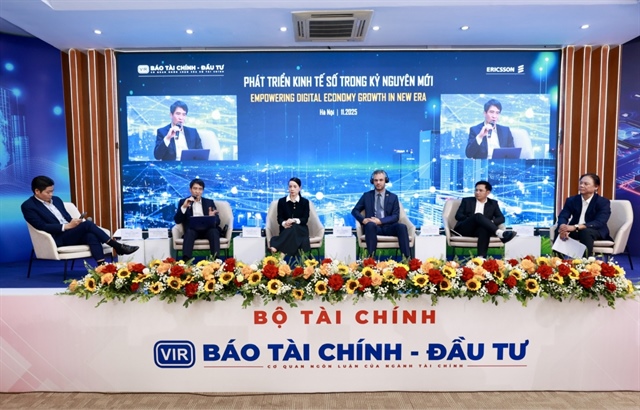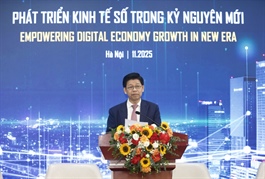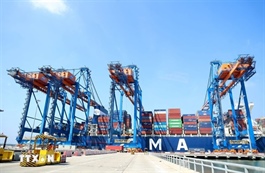New policy momentum powers Vietnam’s digital economy
New policy momentum powers Vietnam’s digital economy
Vietnam's digital transformation is entering a decisive new phase, as AI, 5G, and bold institutional reforms converge to propel the country towards one of the fastest-growing digital economies in the region, driven by strong government commitment and rising confidence from leading local tech enterprises.
On November 25, at the Digital Transformation 2025 conference organised by VIR, leading Vietnamese technology and telecommunications enterprises together with international organisations demonstrated that Vietnam’s digital economy has expanded at a remarkable speed, as AI and 5G open a new chapter for the country’s digital future.
Nguyen Phong Nha, deputy general director of the Authority of Telecommunications under the Ministry of Science and Technology, said that Vietnam now possesses an advanced telecommunications infrastructure that fully meets the needs of the digital economy, with technologies on par with developed nations.
“The rapid expansion of 5G and fibre-optic networks reflects the strong efforts of Vietnam’s telecom operators. Cloud computing technologies are also ready to support national infrastructure, forming a modern, resilient, and well-covered telecommunications backbone,” he added. “This proves that Vietnam’s infrastructure can fully meet the needs of businesses and economic sectors, and is prepared for foreign investors seeking to enter the Vietnamese market.”

Nguyen Phong Nha, deputy general director of the Authority of Telecommunications under the Ministry of Science and Technology |
To further accelerate national digital economic development, four new strategic resolutions, including Resolutions 57-NQ/TW, 59-NQ/TW, 66-NQ/TW, and 68-NQ/TW, have been adopted. This four-pillar framework focuses on science and technology, international integration, legal reform, and private-sector development, creating new room for enterprises and markets to grow.
Assessing this policy momentum, Nha noted that the resolutions have been translated into sector-specific actions, with the Ministry of Science and Technology (MST) playing a crucial role in promoting innovation.
“From a policy perspective, institutional improvements and legal reforms have advanced rapidly. New policies are being put into practice within a short timeframe, enhancing transparency and facilitating trustworthy, efficient digital-based economic activities,” he said.
Beyond policy support, Nha highlighted how telecom enterprises have acted swiftly to enhance infrastructure resilience. For example, networks in storm-affected areas were restored within just 48-72 hours.
“Foreign high-tech firms investing in Vietnam’s telecom infrastructure are also committed to providing safe, disaster-resilient equipment, while small- and medium-sized enterprises and startups are building applications on digital platforms,” he emphasised.
From a European perspective, Yves Vanderstraeten, vice-chairman of the Digital Sector Committee at EuroCham, stressed that Vietnam is advancing rapidly, with strong momentum in its digital economy and online trade. He noted that the Vietnamese government has shown clear commitment to digital transformation.
“The UN e-government index shows Vietnam rising 15 places, from 86 to 71, which is the proof of strong commitment and tangible progress achieved in a relatively short time,” he said.
“EuroCham’s quarterly surveys show that European investor confidence in Vietnam is significantly higher than two years ago. We remain very optimistic about future investment opportunities,” he added.
From an enterprise standpoint, Hoang Van Ngoc, chief of the strategy division at Viettel, identified four major trends currently shaping the landscape of Vietnam’s digital economy.
“First is the AI-isation of everything, which is driving the digital economy. Second is the rise of data: data extraction, analysis, utilisation, and building ecosystems around data. Third is the shift to cloud computing. And fourth is innovation across digital platforms and data-driven ecosystems,” Ngoc stated.

Hoang Van Ngoc, chief of the strategy division at Viettel |
Reflecting on Vietnam’s position in the global digital era, the Viettel representative described Vietnam as one of the fastest-growing digital transformation nations. The government aims for the digital economy to contribute 30 per cent of GDP, and Vietnam’s annual digital-economy growth rate of 25-30 per cent is among the highest in the region.
“Vietnam enjoys several advantages: a dynamic and open government committed to institutional reform; a large and expanding base of digital subscribers; and one of the most advanced telecommunications infrastructures in the world. Viettel alone will operate 28,000 5G stations by the end of 2025, with 90 per cent population coverage,” the representative noted.
“Vietnam also has strong IT talent, and importantly, we have transitioned from being digital-product consumers to digital-product creators, with the potential to export these solutions,” Ngoc added.
Sharing the perspective of another major telecom-digital enterprise, Le Xuan Son, deputy general director of VNPT-IT, emphasised the central role of human capital in executing the digital-economy agenda.
“Vietnam can now be fully confident about its infrastructure. Issues such as submarine cable incidents have greatly diminished, and cybersecurity remains secure. The newly issued resolutions act as a powerful catalyst: Resolution 57 serves as the locomotive guiding technological direction, Resolution 66 provides the institutional railway tracks, Resolution 69 supports international integration, and Resolution 68 empowers private-sector dynamism. Together, they form a machine driving digital economic development,” he said.

Le Xuan Son, deputy general director of VNPT-IT |
However, Son also acknowledged existing limitations that must be addressed. For instance, Vietnam’s sandbox mechanisms remain underdeveloped, and while “Made in Vietnam” digital platforms are encouraged, their presence remains limited.
“In our view, digital economy progress cannot be measured merely by internet penetration or GDP growth. The digital economy is fundamentally data-driven; when data becomes a core asset and is effectively governed, growth potential becomes immense. Technology provides the tools, but people are the decisive factor in execution,” Son noted, adding that human capability will determine the success of the four strategic resolutions.
Bui Kim Thuy, vice-president of the President Club, noted that while citizens may not fully grasp the conceptual details of the four resolutions, they clearly perceive the outcomes: Vietnam’s internet and 5G quality is among the world’s best, yet prices remain among the lowest.
“Nearly all citizens have access to high-speed internet, including free access in many public spaces. This leaves a very positive impression among both domestic users and foreign experts,” she said.
Discussing sandbox implementation under the new resolutions, Thuy pointed out the unique challenges facing state-owned enterprises.
“The dual mandate of generating business results while fulfilling state responsibilities means they cannot take risks the way private firms can. In a recent discussion with leaders of a major state-owned economic group, they noted that private firms can operate at a loss for years, whereas a single year of losses would be disastrous for SOEs. This makes sandbox experimentation extremely difficult without special mechanisms approved by the government or the Politburo,” Thuy stated.
She further emphasised the critical importance of 5G, calling it the backbone of the digital economy.
“Many large corporations are already deploying 5G to optimise real-time production. Vietnam’s top enterprises are surpassing national standards in technology adoption. The biggest challenge now lies within small- and medium-sized enterprises, where digital technology adoption remains limited, creating significant disparities in implementation capacity,” she added.

Overview of the panel discussion |
- 15:27 26/11/2025























